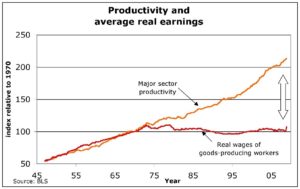Myth: Wages are a function of worker skill and productivity.
Hardly a week goes by without some politician complaining about a so-called “skills shortage” and the need for more worker training (or re-training). This implies that if we as a society can get everyone appropriately trained, not only will jobs materialize, but incomes (along with both profits and GDP) will increase. The real evidence, however, indicates otherwise.
GDP went down dramatically in the 1970s, rising around 1980, gradually falling to the middle 1990s and then rising slightly again at the turn of the century:

Productivity also declined between 1975 and 1995, but recovered dramatically in the middle 1990s:
 Data Source: US Bureau of Labor Statistics
Data Source: US Bureau of Labor Statistics
Increasing productivity at the same time wages declined produced a significant “productivity gap:”

If GDP and productivity grow while wages are stagnating, where does the excess go?
 Data Source: US Dept. of Commerce, Bureau of Economic Analysis
Data Source: US Dept. of Commerce, Bureau of Economic Analysis